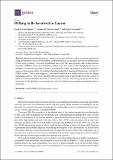Files in this item
Willing to be involved in cancer
Item metadata
| dc.contributor.author | Gunn-Moore, Francis James | |
| dc.contributor.author | Tilston-Lunel, Andrew Martin | |
| dc.contributor.author | Reynolds, Paul Andrew | |
| dc.date.accessioned | 2016-07-21T15:30:05Z | |
| dc.date.available | 2016-07-21T15:30:05Z | |
| dc.date.issued | 2016-07-18 | |
| dc.identifier | 244239701 | |
| dc.identifier | 92f8c56f-b082-4f9e-ad60-af113314a6a7 | |
| dc.identifier | 84979240016 | |
| dc.identifier | 000381493100008 | |
| dc.identifier.citation | Gunn-Moore , F J , Tilston-Lunel , A M & Reynolds , P A 2016 , ' Willing to be involved in cancer ' , Genes , vol. 7 , no. 7 , 37 . https://doi.org/10.3390/genes7070037 | en |
| dc.identifier.issn | 2073-4425 | |
| dc.identifier.uri | https://hdl.handle.net/10023/9189 | |
| dc.description | F.J.G-M., A.M.T-L. and P.A.R. were funded by the Anonymous Trust, University of St Andrews. | en |
| dc.description.abstract | Genome sequencing is now a common procedure, but prior to this, screening experiments using protein baits was one of the routinely used methods that, occasionally, allowed the identification of new gene products. One such experiment uncovered the gene product called willin/human Expanded/FRMD6. Initial characterization studies found that willin bound phospholipids and was strongly co-localised with actin. However, subsequently, willin was found to be the closest human sequence homologue of the Drosophila protein Expanded (Ex), sharing 60% homology with the Ex FERM domain. This in turn suggested, and then was proven that willin could activate the Hippo signalling pathway. This review describes the increasing body of knowledge about the actions of willin in a number of cellular functions related to cancer. However, like many gene products involved in aspects of cell signalling, a convincing direct role for willin in cancer remains tantalising elusive, at present. | |
| dc.format.extent | 13 | |
| dc.format.extent | 2232321 | |
| dc.language.iso | eng | |
| dc.relation.ispartof | Genes | en |
| dc.subject | Willin | en |
| dc.subject | FRMD6 | en |
| dc.subject | FERM proteins | en |
| dc.subject | Cancer | en |
| dc.subject | RC0254 Neoplasms. Tumors. Oncology (including Cancer) | en |
| dc.subject | QH426 Genetics | en |
| dc.subject | QH301 Biology | en |
| dc.subject | SDG 3 - Good Health and Well-being | en |
| dc.subject.lcc | RC0254 | en |
| dc.subject.lcc | QH426 | en |
| dc.subject.lcc | QH301 | en |
| dc.title | Willing to be involved in cancer | en |
| dc.type | Journal item | en |
| dc.contributor.institution | University of St Andrews. School of Biology | en |
| dc.contributor.institution | University of St Andrews. Institute of Behavioural and Neural Sciences | en |
| dc.contributor.institution | University of St Andrews. Biomedical Sciences Research Complex | en |
| dc.contributor.institution | University of St Andrews. School of Medicine | en |
| dc.identifier.doi | https://doi.org/10.3390/genes7070037 | |
| dc.description.status | Peer reviewed | en |
This item appears in the following Collection(s)
Items in the St Andrews Research Repository are protected by copyright, with all rights reserved, unless otherwise indicated.

